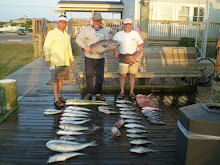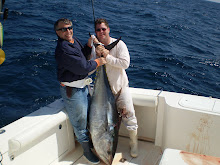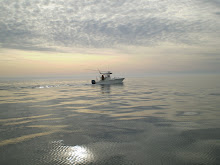
By Jim Field
Now we have a petition, in the wake of the oil spill debacle, by an environmental group requesting the U.S. government to declare the bluefin tuna an endangered species and afford it protections that come with this designation. The organization gets an "A" for effort although nothing will happen--even if things go in the bluefin's favor--for many years given complex and cumbersome legal processes. But perhaps it's a start that will attract attention and build momentum for fish conservation. The NYTimes article below, announcing the legal filing, is very informative in that it casts light on unknown spawning practices, the upshot being that no one knows if the oil will kill fish eggs of all kinds--tuna, sailfish, marlin, etc. So we won't actually know for many years the toll the oil might take on fish stocks. One negative leading indicator: the spill occurred in spring--the same time fish spawn in the Gulf. Let's hope the bluefin and other species are not hardwired to lay their eggs in the same place year after year, but are able to move on to water they know/sense to be clean and desirable.
For the record, I favor a total shutdown of bluefin tuna fishing globally for two decades to allow the species to recovery--and indeed survive. Let mankind eat tofu and chicken. And we need to tell Japan to back off or we close our market to their products. Time to play hardball with them, and other short-sighted nations.
Photographs accompanying the article:
Pierside with a newly-landed bluefin tuna

A newly-hatched bluefin tuna

Endangered-Species Status Is Sought for Bluefin Tuna
By ANDREW W. LEHREN and JUSTIN GILLIS
 Fearing that the oil spill in the Gulf of Mexico will deal a severe blow to the bluefin tuna, an environmental group is demanding that the government declare the fish an endangered species, setting off extensive new protections under federal law.
Fearing that the oil spill in the Gulf of Mexico will deal a severe blow to the bluefin tuna, an environmental group is demanding that the government declare the fish an endangered species, setting off extensive new protections under federal law. Scientists agree that the Deepwater Horizon spill poses at least some risk to the bluefin, one of the most majestic — and valuable — fishes in the sea. Its numbers already severely depleted from record levels, the bluefin is also the subject of a global controversy regarding overfishing.
The bluefin is not the only fish that spawns in the gulf, and while it is often a focus of attention, researchers are worried about the impact of the Deepwater Horizon oil spill on many other species.
In fact, scientists say, it is virtually certain that billions of fish eggs and larvae have died in the spill, which came at the worst possible time of the year. Spawning season for many fish in the gulf begins in April and runs into the summer. The drilling rig exploded on April 20, and the spill has since covered thousands of square miles with patches of oil.
Both the Bush and Obama administrations tried to win greater international protection for the bluefin, but their efforts were derailed by opposition from countries like Japan, where a single large bluefin can sell in the sashimi market for hundreds of thousands of dollars. (The tuna fish sold in cans comes from more abundant types of tuna, not from bluefin.)
The bluefin uses the Gulf of Mexico as a prime spawning ground, and the gulf is such a critical habitat for the animal that fishing for it there was banned in the 1980s. But after spawning in the spring and summer, many tuna spend the rest of the year roaming the Atlantic, where they are hunted by a global fishing fleet.
The environmental advocacy group, the Center for Biological Diversity, in Tucson, filed the request under the Endangered Species Act in late May. If the petition is granted, a process that could take years, the endangered listing would require that federal agencies conduct exhaustive analysis before taking any action, like granting drilling permits, that would pose additional risk to the fish.
Beyond tuna, other animals at apparent risk of harm include the whale shark, the largest fish in the ocean, and a group known as billfish, the foundation of a large recreational fishery in the Gulf of Mexico and the western Atlantic. The billfish that could be affected include the fastest fish in the ocean, the sailfish, as well as blue marlin and swordfish.
“This is a much bigger problem than people are making out,” said Barbara Block, a Stanford researcher who is among the world’s leading experts on the bluefin tuna. “The concern for wildlife is not just along the coast; it is also at sea. We’re putting oil right into the bluewater environment.”
Some of the science documenting the risks that oil drilling poses to spawning fish was paid for by none other than the Minerals Management Service, the federal agency responsible for leasing offshore tracts for oil development.
Yet the results appear to have had little impact on the way the agency carried out its business. For instance, it never adopted seasonal limitations on drilling in the gulf that might have reduced the risk of oil spills during spawning season. It also dismissed the dangers that drilling posed to deep-water fish as “negligible.”
President Obama has acknowledged the agency’s failings. Its director, S. Elizabeth Birnbaum, resigned, and a reorganization of the agency’s functions is under way (last week, it was renamed the Bureau of Ocean Energy Management, Regulation and Enforcement).
The agency responded to inquiries by saying that in light of the Deepwater Horizon spill, its policies — including those for fisheries — were under review.
Given that a single female fish can produce tens of millions of eggs, scientists say that many billions of them would have been in the water on April 20. The vast majority of those would never survive to adulthood even in normal times; now bathed in oil, fewer will make it.
“It’s obvious that any egg or larvae encountering oil will die,” said Molly Lutcavage, director of a research center on large fish and turtles at the University of Massachusetts at Amherst.
Less clear is whether fish would have continued to lay eggs near the spill after it began. Most fish can smell, and researchers hope that at least some species would have avoided spawning in oil. However, fish that can be readily spotted from the air, like whale sharks, have been seen in recent weeks in the vicinity of the spill.
“The question is, does everything shut down if there’s oil there, or do they just go ahead and spawn anyway?” said Eric Hoffmayer, a researcher at the University of Southern Mississippi.
Many important fish in the region, like yellowfin tuna, are able to spawn across broad areas of the gulf, and that means significant numbers of such fish should have hatched this year far from the oil spill.
But other species, including bluefin tuna, apparently have a strong instinct to spawn in a specific part of the ocean. Scientists fear that instinct might overcome the presence of oil in the water, causing the fish to spawn in areas where their offspring would be likely to die. One of the spawning areas in the gulf favored by bluefin is in the vicinity of the spill, Dr. Block said.
The risks the spill poses to fish of all kinds have provoked deep alarm among commercial and sport fishing groups. At least a half-dozen major billfishing tournaments scheduled for June and July have been canceled, and tourists who would normally take deep-sea fishing trips this time of year are avoiding the gulf. The American Sportfishing Association estimated that business owners were losing millions of dollars in a recreational fishing industry worth more than $3.5 billion a year in the gulf.
“It’s having a horrific impact on the marine and fishing industry,” said Dan Jacobs, tournament director for an offshore fishing championship. “The big question is, how long is it going to last?”
Given that it takes some big fish years to reach spawning age, the death of larvae and juvenile fish could have consequences that might not show up for a long time.
“The oil spill could be the last straw with these very vulnerable species,” said Ellen Peel, president of the Billfish Foundation, a nonprofit group that supports recreational offshore fishing.









No comments:
Post a Comment